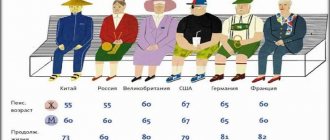At what age is a pension in Germany?
When a citizen of respectable age reaches old age and receives assistance from the state depends on the year of his birth.
Retirement age in Germany
| Year of birth | Pension age |
| Before 1947 | 65 years old |
| From 1947 to 1958 | 65 years +1 month for each previous year |
| 1958 | 66 years old |
| From 1959 to 1963 | 66 years +2 months for each previous year |
| 1964 onwards | 67 years old |
Periodically, the German government discusses raising the retirement age. There are plans to increase it first to 68, and after 2069 to 70 years.
Features of the pension system for older people in Germany
The procedure for paying pensions was established first in Germany, and then in all other countries.
The corresponding “Pact of Generations” was approved at the proposal of Chancellor Bismarck in the 19th century. All working people had to give a share of their earnings to the treasury, from which this money was divided among residents who were unable to work for various reasons. The State Insurance Fund provides three types of pension subsidies:
- upon reaching a certain age;
- due to incapacity for work (fact of disability);
- for the loss of a breadwinner (dependant benefits).
Residents of Germany can hope to receive a pension upon reaching a certain age if their monthly income does not exceed 3,900 euros (most of them do). Elderly people whose salaries are higher than this amount use the services of private financial institutions.
Retirement age
The retirement age for a resident of Germany is 65–67 years. It is determined by the date of birth. That is, those born before 1947 can fully retire at age 65 while maintaining their full pay. Those born since 1958 work until they are 66 years old, and since 1964 - until they are 67 years old. For those born in the intervals between these legally established periods, the age of retirement is calculated according to the scheme “1 year plus 1 month to retirement age.” The increase in the age limit (from 65 years for men and 60 years for women) to the current level occurred in 2012. Programs on changing legislation and increasing the pension threshold up to 70 years are periodically heard.
However, older people in Germany have the opportunity to retire early. Subject to forty-five years of service (with payment of taxes to the insurance fund), a person has the right to retire two years early (at 63–65 years). Women who were born before 1952 and meet other requirements are allowed to retire upon reaching 60 years of age. Also, disabled people and people of certain categories have the right to take a well-deserved rest earlier than the accepted period.
It is worth noting that only those who have participated in the national insurance system for at least five years have the right to systematic payments from the budget. People with less experience do not receive a pension in Germany.
Filling the state pension fund
All officially employed people must pay the pension fee. Only the amount up to a fixed limit specified by law is taxed. For historic sites in Germany (in West Germany), the taxable limit is 5,600 euros. In East Germany (in the former region of the GDR, or “new states”) the part of the salary from which the amount of payment to the pension fund is calculated is less - 4900 euros. Money received above the limit is not taxed.
- Recommended articles to read:
- Social services for older people
- Diseases of old age
- Valuable tips on how to choose a boarding house
Of the fixed limit of 18.7%, half is contributed by the worker, the remaining 50% by the employer. The payment amount is calculated based on the basic rate (salary before taxes). If a German citizen works for a minimum wage (the so-called basis or minijob) and his total income is less than 450 euros per month, then the division of obligations for financial payments looks different: a significant part is contributed by the hiring company (its share is 15%), and the employee pays the remainder (3.7% of income). Contributions from working citizens are not the only way to replenish the insurance fund. Part of the incoming payments are non-fixed payments and subsidies from the main state budget. For example, a share of the environmental tax on fuel is transferred to the pension insurance fund.
Amount of pension payments
Calculating pension payments in Germany is not at all simple. In addition to basic earnings (the amount of payments to the general insurance fund) and length of service, several additional factors are taken into account that form a certain pension score. When calculating this score, they take into account the person’s age, the entire period of his studies in higher educational institutions (reducing the length of service), the period of service in the armed forces, the number of children and a number of other data. Older people in Germany earn less than in many other Western European countries. Half of the pensioners here have about 700 euros. This amount is small. For comparison, the average pension in Denmark is $2,800. But Germany is considered a state in which social programs are quite developed. People who find themselves in difficult life situations will never be left in trouble here. The state pays for pensioners’ housing, medical care, which, by the way, is one of the best in the world in Germany, and provides subsidies for food. This makes it possible to guarantee elderly people a comfortable old age.
Fringe benefits
In addition to mandatory financial assistance, German residents who have reached retirement age can count on other benefits and subsidies.
If they have a medical report, which is confirmed by a specialized institution, old people can travel to specialized sanatoriums for free every year. Germans often choose Karlovy Vary for treatment. Medical care and surgeries are free for elderly people in Germany. Social services provide the services of maids, hairdressers and nurses also free of charge. In addition, pensioners have discounts when visiting swimming pools, health and cultural institutions (museums, theaters, etc.), as well as the right to discounted travel on public transport. Payment for an apartment/house and utilities is also calculated at a reduced rate. Read material on the topic: Where pensioners live better: a small comparative analysis
How the benefit is issued
Germans do not automatically retire. You must submit a document to receive assistance, written by hand or on a special form. The latter, by the way, will speed up the review process.
The following documents are attached to the application:
- tax identification number;
- bank account details (bank name, bank code);
- health insurance card;
- passport or foreign passport.
In some cases, additional documents will be required in addition to the mandatory list:
- birth certificate of the child(ren);
- unemployment certificate;
- educational certificate.
German pension categories
There are two categories of pensions in Germany:
- state;
- private.
State pension
Financial support from the state is provided to citizens upon reaching 65-67 years of age or subject to a number of conditions. These include loss of ability to work, illness, and disability. The minimum benefit amount is 364 euros.
The state pension is paid only with compulsory work experience (minimum 5 years). If a citizen does not have one, he can only rely on private pension provision.
In the states of eastern Germany, pensions are higher than in the western part of the country by an average of 58 euros for men and 249 for women.
Types of pension accruals and how payments are calculated
German pension legislation provides for several types of pension provision; we will analyze several of them in detail.
- Regular old age pension (Altersrentne). This type of pension is accrued to previously employed German citizens upon reaching retirement age. It is formed through mandatory joint insurance contributions between the employee and the employer.
- Early pension for persons with long service . If a German has more than 45 years of work experience, then he has the right to retire 2 years earlier than established by law.
- Disability pension (Erwerbsminderungsrente). This type of security is established for citizens who, due to illness or injury, cannot work and provide for themselves.
- Early pension for certain categories of workers . Some categories of workers whose activities were associated with increased risks to health and ability to work are entitled to a special type of early pension provision. For example, such persons include miners.
- Pensions for widowers (widows), orphans (Hinterbliebenenrente). The closest Russian analogue is the “survivor’s pension”.
In addition to state pension provision, German citizens, if there are grounds, can receive corporate pensions (from the employer) and private ones, but only if appropriate contributions are made to private pension organizations.
Pension size in Germany?
| View | Benefit amount for men (euros) | Amount of benefit for women (euros) |
| Old age pension | 1040 | 580 |
| Survivor's pension | 278 | 594 |
| Disability (disability) pension | 747 | 714 |
If the senior citizen's total income does not exceed 789 euros, he is entitled to receive Grundsicherung - the minimum social benefit. The amount of assistance is calculated depending on the life situation, and ranges from 324-404 euros per month. A person needs to collect a number of documents and apply to Sozialamt - the state Social Security Administration.
In addition to this benefit, the state provides funds for repairs, medicines, and utility bills, depending on the life needs of the pensioner.
How do pensioners live in Germany?
As of January 1, 2018, 30% of the population in Germany are pensioners. The average age of residents in the country is 44 years. After retiring, people lead quite active lives. They love sports, travel, change their region of residence (sometimes even choose another country with a more favorable climate), and go to study at a university.
Most citizens prefer early retirement because... losses from payments are not very significant.
Prices for food, housing, travel and utilities in Germany are quite high, so the average pension is only enough for the bare necessities. The state supports such people by compensating part of the costs. There is the possibility of moving to a nursing home, where nurses and space are provided free of charge. There is no shortage of such establishments in the country. The state pays enough attention to this and even trains specialists for the job. Retirees can do whatever they want without any restrictions.
Private pensions in Germany
There are dozens of private pension funds in the country that provide benefits to older people. The service is popular among wealthy Germans and unofficially employed citizens. By the way, there are few of the latter in the state. How it works?
A person enters into an additional pension agreement and every month contributes a certain amount to the fund, the amount of which he determines independently. The system is cumulative and makes it possible to receive substantial monthly cash assistance in old age.
Funds go directly to an open bank account and not to the fund. In theory, they can be used at any time, but the Germans, a thrifty and practical nation, put them aside for old age.
Filling the state pension fund
All officially employed persons are required to pay the pension fee. Only the amount up to the legal limit is taxed. In the historical territories of the Federal Republic of Germany (in Western Germany), the maximum amount for taxation is 5,600 euros. In East Germany (in the former territory of the GDR, or “new states”) the part of the salary from which the amount of the contribution to the pension fund is calculated is lower - 4900 euros.
Earnings above the limit are not taxed, but periodically the government makes attempts to increase the tax rate or raise the limit. Such initiatives are associated both with an increase in the unemployment rate and with an increase in the average life expectancy of Germans. These factors combine to reduce the general fund and increase the number of retirees relying on monthly benefits.
Of the established limit of 18.7%, half is paid by the employee, half by the hiring company. The levy amount is calculated based on the basic rate (wages before other taxes). If a German citizen works for the minimum wage (the so-called “basis” or “minijob”) and his income is below 450 euros per month, the distribution of the financial burden occurs differently: the employer contributes the majority (his share is 15% of the employee’s salary), and the employed person pays the balance (3.7% of income).
The tax on employed citizens is not the only source of replenishment of the insurance fund. Part of the amounts received by the fund are non-fixed payments and subsidies from the main state budget. Thus, part of the “environmental fee” for fuel is transferred to the pension insurance fund. As of 2015, the pension budget was formed in approximately equal shares by payments from employed citizens and government subsidies.
Contributions to the German pension fund
The amount of the mandatory contribution is affected by the size of the official salary; the higher it is, the more a person contributes “for old age.” In Germany, transfers and other documentary issues are handled by the employer.
The standard monthly contribution to the pension fund is 18.7%. 9.35% of the contribution is paid by the employer, and the same amount is deducted from the person's salary.
If a citizen has an income of less than 450 euros monthly, contributions are distributed differently: 15% is contributed by the employer, 3.7% by the employee.
Every year the Pension Fund sends letters to citizens over 27 years old calculating the expected assistance upon retirement.
Persons who are entitled to assistance before retirement age:
- People with 45 years of official work experience. In reality, there are very few of them in Germany.
- German women born before 1952 who have fulfilled a number of conditions provided by the state retire at age 60.
- Disabled and disabled persons.
Are there any accruals?
Some Russians who are planning to go to Germany and stay there are seriously interested in the question of whether there is a pension there. Considering that in some countries of the world older people are forced to work until their death, the question of whether there are corresponding charges in the German state is understandable.
There are such charges in Germany. On the territory of the German state there are the following types of government assessments:
- according to the age;
- for disability (social);
- by dependency.
Also on the territory of the German state there are state and funded pensions.
What is the amount of charges
Russians who want to move to Germany are interested in the question of how many euros German pensioners receive. How much money a German will receive upon retirement depends on how much he earned at work and how many pension points he managed to accumulate.
Formally, there is no minimum pension on the territory of the German state. If a person who has the right to permanent residence in Germany has reached retirement age, but has not been able to earn a pension above the subsistence level, he is assigned an old-age social benefit. The amount of social benefits for old age in 2021 is 447 euros.
What is the average pension
The average pension size is easy to calculate. The basis for calculating the pension is a conditional pension unit, which is designated as the “basic pensioner”. A conditional pension unit is considered to be a person who has 45 years of average salary and retired at the age of 67.
Officially, the average pension in the German state is 782 euros. But this figure is not relevant for everyone. Not every citizen of the German state has forty-five years of work experience. The average salary also needs to be earned.
Average salary in Germany (2020)
In the western states of the German state, the average pension for men in 2021 is 1 thousand euros. The average pension for women living in Western Germany is half that. In 2021 it is 700 euros.
In the eastern states of the German state, the average pension for men in 2021 is 110 euros. The average pension for “eastern” young ladies in 2021 is 950 euros. This is explained simply. In the lands of the former German Democratic Republic, representatives of the fair sex worked on an equal basis with men and had considerable experience.
Some retirees are eligible to receive corporate savings. Germans can also receive savings from private pension funds.
Widowed subjects of the German state have the right to a double pension.
Another promotion
In 2021, the average pension in the German state was once again increased. German pensioners received the largest increase in the last 23 years.
According to A. Nales, Federal Minister of Social Affairs and Labor, in the west of the country the increase in pension accruals will be 4.25 percent. In the east of the German state, the increase in pension accruals will be 5.95 percent. The Minister believes that improving the financial security of retirees has become possible due to stabilization in the labor market and an increase in the level of the national economy. Increased wages also played a role.
An increase in pension accruals is provided through special cash desks. The budget of the German state has nothing to do with it. The level of insurance pension contributions for Germans who continue to work is not subject to change.
Main types of pension accruals
Germans who have worked in Germany for 5 years or more are entitled to receive government accruals. Receiving pension accruals is simple. To do this, a resident of the German state undertakes to monthly contribute at least 19.5% of his earnings to the Pension Fund. This contribution is relevant for the employer and subordinate. The amount of contributions to the pension fund per person is 9.75 percent.
In recent years, the prerequisites for a serious crisis have appeared in the state pension system. Every year the number of officially employed people making contributions to the pension fund becomes smaller. The number of pensioners, on the contrary, is only increasing.
Some subjects of the German state receive corporate accruals. This is true for those people who served in large and medium-sized companies. The amount of corporate contributions depends on how many years a person has served in the company. Today the loyalty period is 5 years.
Deductions for German disabled people
According to existing legislation, most benefits and rights for persons with disabilities are regulated by regulations and laws. At the same time, each federal state has its own benefits and rights for persons with disabilities.
A person with a disability who has reached the age of sixty-five has the right to basic security in old age. Also, a person with a disability receives an increase of 17 percent.
Germans with visual impairments also receive deductions. First of all, this applies to people with high visual impairments living in:
- Berlin.
- Hesse.
- Mecklenburg.
The amount of contributions for people with disabilities is 730 euros.
Contributions to veterans
The issue of pension contributions to veterans arose urgently back in 1995. Today, the topic of pension contributions to veterans is still actively discussed. This applies to a greater extent to Russian WWII veterans.
Not long ago, information appeared that the German state had reduced the amount of pension contributions to Russian WWII veterans. Despite the heated debate in the Bundestag initiated by the Left Party, the issue of veterans is still hanging in the air.
WWII veterans in Germany
By law, Russian veterans are entitled to receive German military benefits. To apply for pension contributions, a person who is a veteran must confirm that he has German citizenship.
The amount of basic pension contributions to veterans varies from 120 to 600 euros. Veterans also have the right to receive special additional payments.
Pensions of miners, civil servants
In Germany, citizens of certain professions receive high pension benefits. This category includes:
- miners, miners;
- civil servants (judges, officials, police, etc.);
- church workers.
Miners upon reaching 60 years of age with at least 25 years of mining experience in Germany receive a special type of pension in the average amount of 1,250 euros.
Civil servants ensure and support the national sovereignty of Germany; they can count on high pensions and additional benefits. Their average income is 2,356 euros.
Teachers, doctors, firefighters and other public sector workers are classified as government employees and receive increased pension benefits.
Church workers in Germany are also entitled to increased pension benefits, which are paid by the church pension fund.
Fringe benefits
In addition to certain financial support, citizens of retirement age can count on additional benefits and bonuses. If there are medical indications (documented by the relevant institution), pensioners have the right to an annual free trip to a specialized sanatorium. Germans often choose Karlovy Vary as a place of treatment.
Medical services, including operations, are free for German citizens upon reaching retirement age. Social services provide maids, hairdressers and nurses free of charge. Payments for housing and utilities are recalculated at a reduced rate. Benefits for pensioners in Germany include discounts when visiting swimming pools, health and cultural institutions (museums, theaters, etc.), as well as the possibility of discounted travel on public transport.
If you liked the article, then share it with your friends. Take part in the life of the project!
This is interesting…
Social norm for electricity...
Increase in military pensions in 2014...
Pension for disabled people, disabled people and WWII veterans
In Germany, local authorities independently determine the amount of material support for citizens who are unable to work for health reasons. The benefit is approximately 600 euros.
Disabled people of the 1st category receive the most - 100% of the average old-age pension. For the 2nd, 90% is charged, for the 3rd – 50%.
The German government believes that WWII participants should receive assistance from the state for the very fact of such status, but there is no uniform amount of benefits. It ranges from 120-600 euros and depends on a number of factors:
- the year of birth;
- availability of awards;
- duration of participation in the war.
Only a German citizen can receive additional payments and benefits for veterans (having a German passport is a prerequisite).
Who gets the least pension in the country?
There is no official concept of a minimum pension benefit in the country. If, upon reaching the minimum age, a citizen does not have enough funds to ensure a minimum subsistence level, then the basic benefit Grundsicherung is assigned.
This benefit is received by citizens whose income is less than 838 euros. Most often these are emigrants who came to the country in old age.
Pension for German widows and orphans
The government takes care of families and supports spouses at the time of loss of a partner. You can apply for a “widow’s pension” if the deceased spouse:
- made contributions to the pension fund for at least 5 years;
- your partner had an accident at work;
- the deceased was already receiving a pension.
For the first three months after receiving the benefit, the widower (widow) receives the full amount of the benefit. From the 4th month, the pension falls by 25 or 50% of the original amount, depending on the assigned benefit category.
The widow's pension is automatically canceled if the widower remarries.
Bismarck's "Generation Pact"
State social insurance first appeared in Germany. This happened back in the 19th century under the leadership of the legendary Otto von Bismarck. The principle is simple: working citizens support pensioners by contributing a certain part of their earnings to the state pension fund. The money is distributed and immediately transferred to pensioners.
Intergenerational solidarity was not initially burdensome for workers. The size of deductions in 1891 was only 1.7%, and this suited everyone quite well. There was no unemployment in those years, and life expectancy was much lower than it is now. Much has changed since then - society has aged, and the amount of contributions to the pension treasury is already 18.9%.
A percentage of the wages of the German working population goes into the pension treasury.
Orphans' pension in Germany
Upon the loss of one breadwinner, a minor receives financial assistance from the state only if the parent had at least 5 years of official work experience. As a rule, it is 10% of the average salary of the deceased (small pension). In the event of the death of both breadwinners, the minor receives a large pension - 20% of the official income of the parents.
The benefit is paid until the age of 18, but can be extended under a number of conditions:
- an orphan cannot go to work due to physical (mental) injuries (disability);
- studies at school (technical school, institute);
- undergoes military (environmental, social) service.
Prospects for the pension system in Germany
In Germany, 20% of the population is of advanced age or has serious health problems and cannot replenish the state treasury. In this regard, the government is thinking about the need to “push back” the retirement age.
In Germany, it is not customary to celebrate old age with children or accept financial support from them; support for older people falls on the shoulders of the government. Senior officials are discussing the possibility of increasing the percentage of contributions to the pension fund, but no specific decisions have been made yet.
Pension formula
Mathematically, the pension formula looks like this:
{\displaystyle {\text{Rente}}={\text{EP}}\cdot {\text{ZF}}\cdot {\text{RAF}}\cdot {\text{aRW}}}
where:
Rente
- monthly pension expressed in euros (German Rente)
EP
- pension points (German Entgeltpunkte)
ZF
- output coefficient (German Zugangsfaktor)
RAF
- coefficient determining the type of pension (German Rentenartfaktor)
aRW
- current value of the pension points (German: aktueller Rentenwert)
Pension points EP
EP pension points reflect the amount of pension contributions of the insured for all years of his working activity. According to § 63 of the sixth book of the German Social Code (SGB VI), the amount of pension contributions (contributions to the pension fund) within one year from a salary equal to the average annual salary of all insured persons in the pension fund gives 1 pension point.
Thus, pension points:
- reflect the dependence of the pension on income: The pension point earned during one calendar year reflects the ratio of the individual income of the insured person to the average income of the insured persons of the same calendar year.
- allow you to compare pension contributions for different years: For a person applying for a pension, the relative amount of pension contributions paid is important, and not the year in which these contributions were paid.
- allow you to create a dynamic income-related pension: Pension points together with the current value of the aRW pension point form the basis of a dynamic, income-related pension system.
Data table for calculating pension points for old age pension:
| Year | Pension insurance tariff | West Germany | East Germany | ||
| (employee + employer share) | Average salary | Maximum | Average salary | Maximum | |
| 1990 | 18,7 % (9,35 % + 9,35 %) | ||||
| 1991 | 17,7 % (8,85 % + 8,85 %) | ||||
| 1992 | 17,7 % (8,85 % + 8,85 %) | ||||
| 1993 | 17,5 % (8,75 % + 8,75 %) | ||||
| 1994 | 19,2 % (9,60 % + 9,60 %) | ||||
| 1995 | 18,6 % (9,30 % + 9,30 %) | ||||
| 1996 | 19,2 % (9,60 % + 9,60 %) | ||||
| 1997 | 20,3 % (10,15 % + 10,55 %) | ||||
| 1998 | 20,3 % (10,15 % + 10,15 %) | ||||
| 1999 | 19,5 % (9,75 % + 9,75 %) | ||||
| 2000 | 19,3 % (9,65 % + 9,65 %) | 4480 DM | 3640 DM | ||
| 2001 | 19,1 % (9,55 % + 9,55 %) | 4480 DM | 3780 DM | ||
| 2002 | 19,1 % (9,55 % + 9,55 %) | 2345 | 1960 | ||
| 2003 | 19,5 % (9,75 % + 9,75 %) | 2380 | 1995 | ||
| 2004 | 19,5 % (9,75 % + 9,75 %) | 2415 | 2030 | ||
| 2005 | 19,5 % (9,75 % + 9,75 %) | 2415 | 2030 | ||
| 2006 | 19,5 % (9,75 % + 9,75 %) | 2450 | 2065 | ||
| 2007 | 19,9 % (9,95 % + 9,95 %) | 2450 | 2100 | ||
| 2008 | 19,9 % (9,95 % + 9,95 %) | 2485 | 2100 | ||
| 2009 | 19,9 % (9,95 % + 9,95 %) | 2520 | 2135 | ||
| 2010 | 19,9 % (9,95 % + 9,95 %) | 2555 | 2170 | ||
| 2011 | 19,9 % (9,95 % + 9,95 %) | 2555 | 5500 | 2240 | 4800 |
| 2012 | 19,6 % (9,80 % + 9,80 %) | 2625 | 5600 | 2240 | 4800 |
| 2013 | 18,9 % (9,45 % + 9,45 %) | 2695 | 5800 | 2275 | 4900 |
| 2014 | 18,9 % (9,45 % + 9,45 %) | 2765 | 5950 | 2345 | 5000 |
| 2015 | 18,7 % (9,35 % + 9,35 %) | 2835 | 6050 | 2415 | 5200 |
| 2016 | 18,7 % (9,35 % + 9,35 %) | 2905 | 6200 | 2520 | 5400 |
| 2017 | 18,7 % (9,35 % + 9,35 %) | 2975 | 6350 | 2660 | 5700 |
| 2018 | 18,6 % (9,30 % + 9,30 %) | 3045 | 6500 | 2695 | 5800 |
Output factor ZF
This coefficient was included in the pension formula in 1992. Upon reaching retirement age, the insured person receives an old-age pension. To take into account the time of retirement, the output coefficient ZF is used.
Coefficient ZF = 1 if retirement occurs at an age in accordance with German pension legislation. With an earlier retirement, the ZF coefficient will be less than 1, and with a later retirement, it will be greater than 1.
In case of early retirement, the ZF exit coefficient is reduced by 0.003 for each calendar month of early retirement. This corresponds to a reduction in pension of 0.3% for each month. This reduction in pension applies to the entire period of pension payment, and in the future does not depend on the age of the recipient.
If you retire later, the ZF retirement factor increases by 0.005 for each calendar month following the achievement of the statutory retirement age. This corresponds to an increase in pension of 0.5% for each month.
Starting from January 1, 2001, this ZF coefficient was also introduced for the calculation of other types of pensions. The calculation procedure and the value of the ZF coefficient for them are determined by the relevant rules of German pension legislation.
Output factor ZF for old age pension:
| Retirement | ZF |
| 4 years earlier (48 months) | 0.856 |
| 3 years earlier (36 months) | 0.892 |
| 2 years earlier (24 months) | 0.928 |
| 1 year (12 months) earlier | 0.964 |
| 3 months earlier | 0.991 |
| 2 months earlier | 0.994 |
| 1 month earlier | 0.997 |
| by achievement penny. age | 1 |
| 1 month later | 1.005 |
| 2 months later | 1.01 |
| 3 months later | 1.015 |
| 1 year later (12 months) | 1.06 |
| 2 years later (24 months) | 1.12 |
| 3 years later (36 months) | 1.18 |
| 4 years later (48 months) | 1.24 |
RAF coefficient
The RAF coefficient was introduced into the pension formula in 1992 and determines the type of pension. Thanks to this coefficient, it became possible to use the pension formula for calculating other types of pensions.
RAF pension type factor:
| Type of pension | RAF |
| old age pension | 1 |
| pension in connection with raising a child/children | 1 |
| total disability pension | 1 |
| partial disability pension | 0.5 |
| widow/widower's pension is large | 0.55 |
| small widow/widower pension | 0.25 |
| orphan's pension | 0.2 |
| half-orphan's pension | 0.1 |
Cost of aRW pension point
The current value of the pension point is calculated annually and published on July 1. Its value depends on the size of salaries, on the level of insurance contributions to the pension fund and on the demographic situation in the country. A separate formula is used to calculate the current value of a pension point.
Examples of calculations
Example 1
The worker, born in 1946, worked in West Germany for 45 years, regularly contributing his insurance contributions to the pension fund. Moreover, his salary always corresponded to the average salary of all those insured in the pension fund, which gives him 1 pension point for each year.
At the age of 65, he will retire in autumn 2021 as an old-age pension (RAF = 1) in accordance with German pension law (ZF = 1). At the time of retirement (autumn 2021), the value of the pension point was aRW = 27.47 Euro. From July 1, 2019, the value of a pension point has been increased to aRW = 28.61 Euro.
Calculation of monthly pension for the period from autumn 2021: Rente = 45 x 1 x 1 x 27.47 = 1236.15 Euro/month.
Calculation of monthly pension for the period from July 1, 2021: Rente = 45 x 1 x 1 x 28.61 = 1287.45 Euro/month.
Example 2
The worker, born in 1946, worked in West Germany for 45 years, regularly contributing his insurance contributions to the pension fund. Moreover, his salary was 2/3 of the average salary of all those insured in the pension fund. At the age of 65, he will retire in autumn 2021 as an old-age pension (RAF = 1) in accordance with German pension law (ZF = 1).
Calculation of monthly pension for the period from autumn 2021: Rente = 45 x 2/3 x 1 x 27.47 = 824.10 Euro/month.
Calculation of monthly pension for the period from July 1, 2021: Rente = 45 x 2/3 x 1 x 28.61 = 858.30 Euro/month.











